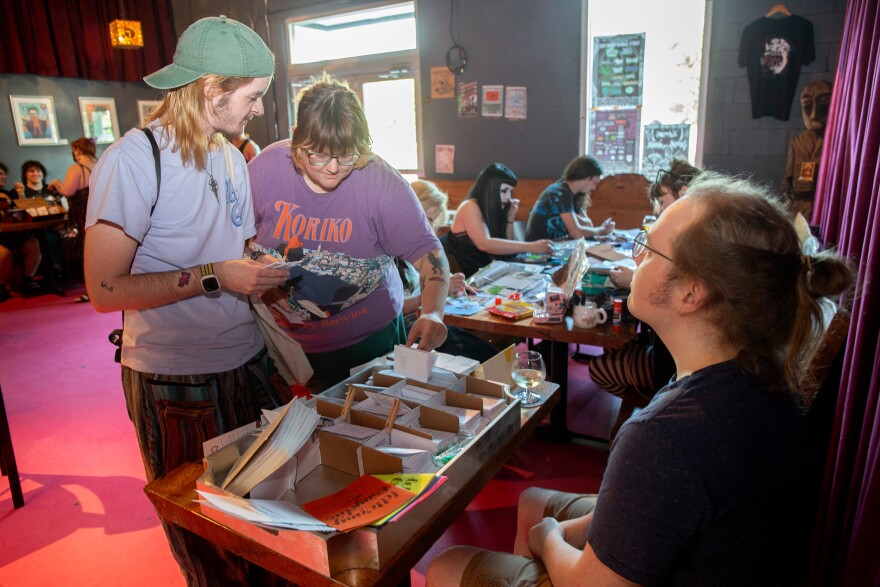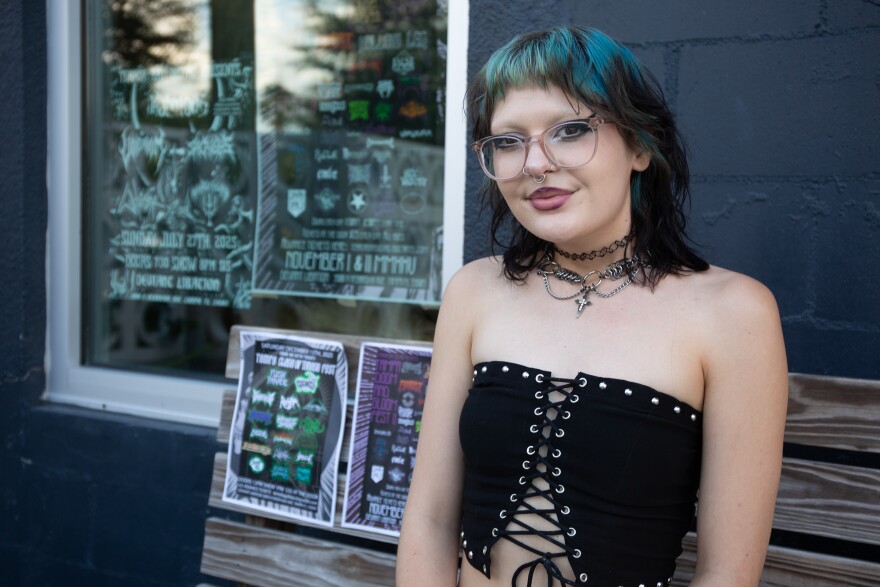It's 6 p.m. on a recent Saturday at Deviant Libation, a Tampa brewery.
In the corner, several people sit around a long table, scissors, scrap paper and collage materials piled high in front of them. M Calins — better known by their artist name "them nightingale" — is crafting a zine on anti-authoritarianism.
As she pastes magazine cutouts onto a piece of black construction paper, she talks about her inspiration.
“I'm sort of just riding the wave of whatever my intuition dictates, but based on what's here. Plus, I'm feeling so charged politically, you know. The state of the world is sour. It is fermented. It's putrefied.”

She also breaks down what exactly a zine is.
"You can have resource zines where they're talking about like how to help the community, or how to protest safely, and it's just a very bite-sized, digestible way to get the information, or in another capacity, like art, just expressing themselves, or like, concept pieces.
Zine history
The concept of the zine dates back to the 1930s as a way for science-fiction fans to discuss content they loved. Copy machines and copy shops led to a rise in their popularity in the 1960s and '70s, and then became a huge part of the '80s and '90s "do-it-yourself" punk culture.
Reactions to current politics, lived experiences from marginalized communities, and niche topics are common zine themes. Nick wasn't comfortable giving his last name, but his first Zine was on — of all things — porridge.
At his table in the back of the brewery, some of his other zines bare titles like: "Fearing the Future: Anxiety and the Death of All Things;” "St. Pete Pride Turned Me Straight;” and "Bird Flu and You: H5N1 in an Anti-Science Age."
On a lighter note, propped up in the back, is a how-to guide on lettering with Crayola markers.

A curious visitor asks him why he got into zines in the first place:
"I needed an art form that was low barrier an entry as possible because I struggle a lot with perfectionism,” Nick told them.
At a table adjacent to the group making zines, Charlie Suor is selling copies of his zine project — which he calls "Transylvanian Horror" — for $1 apiece.
“It's just a sheet of printer paper. I make them online. I do them digitally, so I can post them online as well and have, like, the same quality of help, because I want to make it equitable," Suor said. "I want this to be as accessible as possible to people. So making these … anyone can get started.”
The zines he’s selling today are an extension of his research into horror films like Frankenstein — and how it relates to how some trans and queer people feel they're being demonized in popular culture and in real life.
"In the first one, I sort of puzzled the fact that, yeah, trans folks and trans theorists, we've been comparing ourselves to the monster for a long time," Suor said. "But I think that that comparison isn't necessarily outdated, but it needs an update. Because not only are we the monster, this creation, I think that we're Frankenstein, too. You know, we've put ourselves together."

International Zine Month
Alex Wrekk of Portland, Oregon, is the creator of July's International Zine Month. They’re widely credited with inspiring many zinesters in later years with their "Stolen Sharpie Revolution: a DIY Resource for Zines and Zine Culture” that was first published in 2002.
They say zines — sold cheaply or traded with other zinesters — are a way to bypass mainstream media and traditional publishing outlets," Wrekk said. "They're a way to share ideas, information and art in an unfiltered way.
"It's definitely one of those, I wouldn't say, reaction, but like, it's a symbiotic relationship with general culture and media, and also, like zines and zine culture, and the things that are not said in other places can be said in zines."
Zine culture is not new, Wrekk said. And while it appears to occasionally make a resurgence, it never went away.
“I think it's more of this object permanence thing," Wrekk said. "The people who've been doing zines for a long time are just like, ‘Oh no, it's another article of zines are making a comeback,’ but it's really not because all of us have still been doing it forever. It's just maybe someone's popular making a zine, and then they like realize that there's a whole other community of people.”
Zine culture
Kay — who goes by their artist name Attic Cat — organized the event at Deviant Libation. Outside the brewery's poster-plastered front doors, they talk about how zine culture is more than just creating inexpensive, ephemeral pieces of art. It helps build relationships.

“What I really love about these events is the community that comes together, especially like queer people, because I feel, we feel, very lonely right now, you know ... I get a little emotional talking about it, but yeah, because we don't have family, especially like during holidays and stuff," Kay said. "It's hard because we can't gather with our families. So having each other is really nice to lean on."
Wrekk said that community is what brings people into the world of zines and keeps them there.
“I could put $1 in an envelope and send it off to someone else, and they would send me back the zine that they made, or I could put my own zine in envelope, send it to someone, and we could trade," Wrekk said. "And I think that that community and that connection is what really kept me interested in it.”
Wrekk, who moved to Portland in 1999, said zine distros and maker spaces were common around the country. In their neighborhood, the Independent Publishing Resource Center — which was “basically like a tree fort for zine kids,” Wrekk said — had a library, photocopier, and computers anyone could use.
“It definitely had a very strong community around it," Wrekk said. "So it's the kind of thing where someone says, ‘Hey, I've got a great idea.’ And everyone jumps up and says, ‘ooh, how can I help you make that happen?’ So it's less about the ego of it. It's about, how can we create community and share things together?”
And while many zines exist in digital formats now with online zinesters selling, trading and otherwise sharing their creations, the community part of zine making has never gone away.
Events like this one at Deviant Libation, Kay said, keep the spirit of zine making going. And zines continue to serve as a form of mutual aid in a time where resources for vulnerable communities are being cut at the state and federal level.
After all, all you really need is a sheet of paper and a writing utensil — and a network of folks willing to share zines to the people who need them most.
Tampa Zine Fest and St. Pete Zine Fest will be held in early 2026. In the spirit of freely sharing information, both are free to zine makers and attendees. Wrekk will also be giving a talk at HalloZine Fest on Oct. 30-31. It will be Pensacola’s first zine festival.




